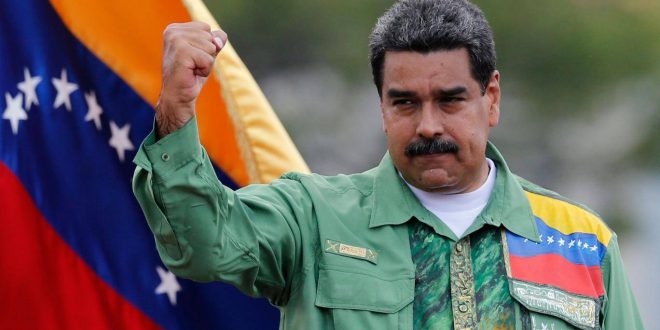President set for victory as main opposition party urges voters to boycott controversial election
Venezuela goes to the polls on Sunday, with incumbent president Nicolas Maduro expected to win a second term in spite of the country’s spiralling economic crisis.
Mr Maduro is set to secure another six-year term on behalf of the ruling Socialist party, but the election takes place under a cloud of controversy with the ruler’s main rivals set to boycott the vote.
More than a million Venezuelans have fled the country in search of a better life abroad as the nation’s once robust oil industry has crumbled, leaving widespread shortages of food and medicines.
Polls suggest voters overwhelmingly blame Mr Maduro for their mounting problems, with many of those who stayed behind now unable to withdraw cash and forced to queue for hours in breadlines.
But the president is likely to emerge victorious after the main opposition party, the Democratic Unity coalition, refused to contest the election as popular candidates were either barred from running or exiled.
The US, the EU, the UN Humans Rights Council and neighbouring South American countries have all voiced concerns over potential vote manipulation in the lead up to the poll.
Mr Maduro, 55, ended his campaign on Thursday dancing on stage before a cheering crowd in Caracas while blaming Venezuela’s increasingly dire outlook on a US-orchestrated “economic war”.
“I extend my hands to all Venezuelans so that we can move forward together with love and take back our homeland,” he told supporters.
“I have seen the future of Venezuela and a historic victory awaits us.”
Mr Maduro, who rose to power on the death of his mentor, Hugo Chavez in 2013, has seen his rule coincide with an increase in problems with crime and poverty in the country.
Around 80 per cent of Venezuelans believe the president is doing a bad job, although little more than a third are expected to vote, according to recent polling.
Mr Maduro’s main rival, independent candidate Henri Falcon, has been hamstrung by the challenge of running against a powerful incumbent while trying to offer sceptical voters a reason to defy the boycott.
Blasting Mr Maduro as the “candidate of hunger,” he has campaigned on a promise to accept humanitarian aid and seek assistance from the International Monetary Fund – all proposals Mr Maduro has rejected as tantamount to surrendering to the US “empire.”
“I swear that I will liberate Venezuela from this dictatorship,” Mr Falcon shouted to supporters at his final campaign rally on Thursday in his home city of Barquisimeto. “I swear it in the name of God.”
Also on the ballot is television evangelist Javier Bertucci, who has cut into Mr Falcon’s support by providing free soup at rallies.
Javier Corrales, a Venezuela expert at Amherst College, warned the opposition’s sit-out strategy could be as disastrous as its boycott of congressional elections in 2005.
On that occasion, the ruling party swept all seats, giving it the ability to pass legislation removing presidential term limits that further strengthened Mr Chavez’s grip on power.
“The irony is that this is the least democratic election of all but it’s also the best chance the opposition has ever had,” said Mr Corrales.
“If Maduro wins by a large margin, he’ll take it is as a green light to continue radicalising and moving in the direction of completely destroying the private sector.”
The Independent
 Lebanese Ministry of Information
Lebanese Ministry of Information



